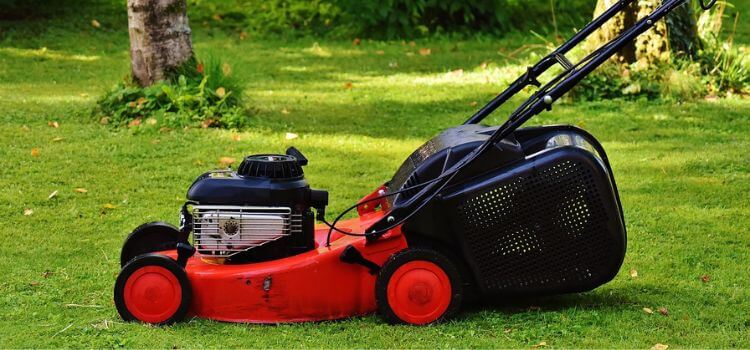As an Amazon Associate, I earn from qualifying purchases.
Lawn mowers are loud due to their internal combustion engines and spinning blades. These components generate significant noise during operation.
Lawn mowers are essential tools for maintaining neat lawns. However, their noise often disrupts the tranquillity of neighbourhoods. The primary culprits behind this noise are the powerful internal combustion engines and rapidly spinning blades. These engines produce mechanical vibrations and exhaust sounds, while the blades create additional noise as they cut through grass.
Manufacturers strive to balance power and noise reduction, but achieving complete silence remains challenging. Understanding the noise sources can help users take measures to minimize disturbance, such as using ear protection or opting for quieter electric models. Effective lawn mower use ensures a well-maintained lawn without excessive noise pollution.
The Science Behind Noise Levels
Many homeowners wonder, “Why are lawn mowers so loud?” The noise levels can be startling and even bothersome. Understanding the science behind noise levels helps to explain why these machines are so noisy.
How Lawn Mowers Generate Noise
Lawnmowers generate noise through various mechanisms. The prominent noise comes from the engine. Internal combustion engines in gas-powered mowers produce a lot of sound. The rapid movement of engine parts creates vibrations, which translate into noise.

Another significant source of noise is the blades. When the blades spin, they cut through the air and grass, producing a loud whirring sound. Here are some key points:
- The engine’s combustion process is inherently noisy.
- Blades generate noise as they spin and cut grass.
- Vibrations from moving parts contribute to overall noise levels.
Factors Contributing To Noise Levels
Several factors contribute to lawn mower noise levels. One major factor is the engine type. Gas-powered engines are typically louder than electric ones. This is due to the combustion process, which generates more sound.
Another factor is the age and condition of the mower. Older mowers or those in poor condition tend to be noisier. Worn-out parts and loose components can increase vibrations and, thus, noise levels.
Additionally, the design of the mower plays a role. Mowers with better sound-dampening materials and design features are quieter. Here are some contributing factors:
- Engine type (gas vs. electric)
- Age and condition of the mower
- Design features and sound-dampening materials
Understanding these factors can help you choose a new mower or maintenance one to reduce noise.
Regulations And Standards
Why are lawnmowers so loud? One key reason lies in the regulations and standards governing their noise levels. These regulations aim to balance effective lawn care with community peace.
Noise Regulations For Lawn Mowers
Noise regulations for lawnmowers vary across countries and regions. These rules help reduce noise pollution and protect public health. Here are some critical aspects of these regulations:
- Decibel Limits: Many regions set maximum decibel levels for lawnmowers, which usually range between 85 and 100 decibels.
- Time Restrictions: To minimize disturbance, some areas restrict lawn mower use to certain hours of the day.
- Manufacturing Standards: Manufacturers must adhere to specific standards that limit the noise output of their machines.
Compliance With Noise Standards
Compliance with noise standards is crucial for lawn mower manufacturers. They must ensure their products meet regulations to be legally sold and used. Here are some ways they achieve compliance:
- Noise Testing: Manufacturers test their lawnmowers in controlled environments to measure noise levels.
- Design Improvements: Engineers design quieter engines and better mufflers to reduce noise.
- Certification: Lawnmowers often receive certifications proving they meet noise standards. This certification ensures consumers are buying compliant products.
Compliance is not just about meeting standards, it’s about making a positive impact on communities. By adhering to these standards, manufacturers are actively contributing to the reduction of noise pollution, making communities more pleasant places to live.
Impact On Health And Environment
Why are lawnmowers so loud? This question often comes up as people experience the roaring noise of these machines. The impact on health and the environment is significant. Not only can the loud noise affect hearing, but it also contributes to noise pollution, affecting the environment.
Effects Of Loud Noise On Hearing
Loud noises can damage your hearing. Lawn mowers often produce sounds between 85 and 100 decibels, which can cause hearing loss over time. Prolonged exposure to loud noises can also lead to tinnitus, a constant ringing in the ears.
Here are some effects of loud noise on hearing:
- Temporary hearing loss: Loud noises can make hearing hard for a short time.
- Permanent hearing loss: Long-term exposure can damage hearing permanently.
- Tinnitus: Loud noises can cause a constant ringing in the ears.
Using hearing protection like earplugs or earmuffs can help, but many people do not use them, increasing the risk of hearing damage. It is essential to be aware of the risks and take measures to protect your hearing.
Environmental Impact Of Noise Pollution
Noise pollution affects the environment, too. Loud lawn mowers contribute to this problem. Animals rely on sound for communication and navigation, and loud noises can disrupt their natural behaviours.
Here are some environmental impacts of noise pollution:
- Disturbance to wildlife: Loud noises can scare animals and disrupt their habitats.
- Interference with animal communication: Many animals use sound to find mates and navigate. Noise pollution can interfere with these signals.
- Increased stress: Constant noise can increase stress levels in animals.
Reducing the noise from lawnmowers can help. Electric mowers are quieter than gas-powered ones. Using quieter machines can reduce noise pollution, which helps protect human health and the environment.
Technological Innovations
Many people wonder why lawnmowers are so loud. Lawnmowers have potent engines and cutting blades that create a lot of noise. Technological innovations aim to make these machines quieter. These advancements improve user experience and reduce noise pollution.
Advancements In Quieter Lawn Mower Designs
Modern lawnmowers are designed to be quieter. Manufacturers are using new technologies to reduce noise levels. Here are some key advancements:
- Electric Motors: Electric lawnmowers are quieter than gas-powered ones. They do not have loud engines.
- Improved Blades: New blade designs reduce the noise created when cutting grass.
- Soundproofing: Engineers add materials that absorb sound to the mower’s body.
- Quieter Engines: Modern engines are designed to operate more quietly.
These advancements make lawnmowers quieter and more efficient. Users can enjoy mowing their lawns without disturbing their neighbours.
Noise Reduction Features
Modern lawnmowers come with various noise-reduction features. These features significantly lower the noise levels:
- Insulated Decks: The mower’s deck is insulated to reduce the sound of the blades.
- Low-Noise Tires: Special tires that produce less noise when moving.
- Engine Mufflers: Mufflers are used to reduce engine noise.
- Anti-Vibration Systems: These systems reduce vibrations and noise.
Let’s look at a comparison table of traditional and modern lawnmowers:
Impact On Health And Environment
Why are lawnmowers so loud? This question often comes up as people experience the roaring noise of these machines. The impact on health and the environment is significant. Not only can the loud noise affect hearing, but it also contributes to noise pollution, affecting the environment.
Effects Of Loud Noise On Hearing
Loud noises can damage your hearing. Lawnmowers often produce sounds between 85 and 100 decibels, which can cause hearing loss over time. Prolonged exposure to loud noises can also lead to tinnitus, a constant ringing in the ears.
Here are some effects of loud noise on hearing:
- Temporary hearing loss: Loud noises can make hearing hard for a short time.
- Permanent hearing loss: Long-term exposure can damage hearing permanently.
- Tinnitus: Loud noises can cause a constant ringing in the ears.
Using hearing protection like earplugs or earmuffs can help, but many people do not use them, increasing the risk of hearing damage. It is essential to be aware of the risks and take measures to protect your hearing.

Environmental Impact Of Noise Pollution
Noise pollution affects the environment, too. Loud lawnmowers contribute to this problem. Animals rely on sound for communication and navigation, and loud noises can disrupt their natural behaviours.
Here are some environmental impacts of noise pollution:
- Disturbance to wildlife: Loud noises can scare animals and disrupt their habitats.
- Interference with animal communication: Many animals use sound to find mates and navigate. Noise pollution can interfere with these signals.
- Increased stress: Constant noise can increase stress levels in animals.
Reducing the noise from lawnmowers can help. Electric mowers are quieter than gas-powered ones. Using quieter machines can reduce noise pollution, which helps protect human health and the environment.
Technological Innovations
Many people wonder why lawnmowers are so loud. Lawnmowers have potent engines and cutting blades that create a lot of noise. Technological innovations aim to make these machines quieter. These advancements improve user experience and reduce noise pollution.
Advancements In Quieter Lawn Mower Designs
Modern lawnmowers are designed to be quieter. Manufacturers are using new technologies to reduce noise levels. Here are some key advancements:
- Electric Motors: Electric lawnmowers are quieter than gas-powered ones. They do not have loud engines.
- Improved Blades: New blade designs reduce the noise created when cutting grass.
- Soundproofing: Engineers add materials that absorb sound to the mower’s body.
- Quieter Engines: Modern engines are designed to operate more quietly.
These advancements make lawnmowers quieter and more efficient. Users can enjoy mowing their lawns without disturbing their neighbours.
Noise Reduction Features
Modern lawnmowers come with various noise-reduction features. These features significantly lower the noise levels:
- Insulated Decks: The mower’s deck is insulated to reduce the sound of the blades.
- Low-Noise Tires: Special tires that produce less noise when moving.
- Engine Mufflers: Mufflers are used to reduce engine noise.
- Anti-Vibration Systems: These systems reduce vibrations and noise.
Let’s look at a comparison table of traditional and modern lawnmowers:
| Feature | Traditional Lawn Mowers | Modern Lawn Mowers |
|---|---|---|
| Engine Type | Gas-powered | Electric and quieter gas engines |
| Blades | Standard | Improved and quieter designs |
| Soundproofing | None | Advanced soundproofing materials |
| Noise Level | High | Low |
These features help make lawn mowing a quieter and more pleasant task. They reduce noise pollution and improve the user experience.
Consumer Preferences
Lawn mowers are often loud, which can be a nuisance. Consumer preferences play a significant role in this. Many people want quieter lawn mowers. Understanding why lawn mowers are so loud and what consumers prefer can help manufacturers create better products.
Demand For Quieter Lawn Mowers
Many consumers are looking for quieter lawn mowers. Loud lawn mowers can disturb neighbors and create noise pollution. People want to enjoy their gardens without loud noises. Here are some reasons why there is a demand for quieter lawn mowers:
- Peaceful Environment: Quieter mowers allow for a more peaceful garden experience.
- Respect for Neighbors: Loud mowers can disturb neighbors, especially in densely populated areas.
- Noise Pollution: Reducing noise helps in lowering overall noise pollution in the environment.
Manufacturers are aware of this demand. They are working on developing quieter lawn mowers. For example, electric mowers are generally quieter than gas-powered ones. Battery-operated mowers are also gaining popularity.
Factors Influencing Purchasing Decisions
Several factors influence consumers when they purchase lawn mowers. These factors include:
- Price: The cost of the lawn mower is a significant factor. People often choose more affordable options.
- Noise Level: Consumers prefer quieter models. They want to avoid disturbing their surroundings.
- Durability: A durable lawn mower is a valuable investment. People want products that last longer.
- Maintenance: Low-maintenance lawn mowers are attractive. They save time and effort.
- Environmental Impact: Eco-friendly mowers are becoming popular. They have a lower carbon footprint.
Manufacturers need to consider these factors. They should focus on creating cost-effective, durable, and low-maintenance lawn mowers. Additionally, reducing noise and environmental impact can make their products more appealing. Understanding consumer preferences is crucial for designing better lawn mowers.
Maintenance And Noise Reduction
Lawnmowers are essential for maintaining a neat yard, but their loud noise can be a significant nuisance. Understanding the reasons behind their loudness and implementing maintenance and noise reduction strategies can help make your lawn mowing experience more pleasant. Regular maintenance not only extends the life of your mower but also plays a crucial role in reducing noise levels.
Tips For Maintaining A Quieter Lawn Mower
Regular maintenance of your lawn mower is vital to keeping it quieter. Here are some practical tips:
- Check and Replace Air Filters: Dirty air filters can make the engine work harder and increase noise. Replace the air filter every season.
- Change the Oil: Fresh oil ensures smoother engine operation. Change the oil at least once a year.
- Sharpen the Blades: Dull blades make the engine work harder, causing more noise. Sharpen the blades regularly.
- Clean the Undercarriage: Grass buildup under the mower can create additional noise. Clean it after each use.
- Tighten Loose Parts: Loose screws and bolts can cause rattling noises. Check and tighten them regularly.
Maintaining these components ensures your lawn mower operates more efficiently and quietly.
Noise Control Strategies
Reducing noise from your lawn mower involves specific strategies. Here are some practical approaches:
- Use a Muffler: Install a muffler to reduce engine noise. Mufflers are designed to absorb and minimize sound.
- Soundproofing Materials: Apply soundproofing materials around the engine area. These materials can significantly dampen noise.
- Electric Lawn Mowers: Consider switching to an electric lawn mower. Electric mowers are quieter than gas-powered ones.
- Proper Maintenance: As mentioned earlier, regular maintenance can prevent noise issues.
- Use Ear Protection: Wearing ear protection can help reduce the impact of noise on your hearing.
Implementing these strategies can significantly reduce the noise your lawn mower produces, making your yard work more enjoyable.
Frequently Asked Questions
Yes, quiet lawnmowers do exist. Electric and battery-powered models produce significantly less noise compared to gas-powered mowers. These options are efficient and eco-friendly, making them ideal for noise-sensitive areas.
The noise level of a lawn mower ranges between 85 to 100 decibels. Electric models are generally quieter. Gas-powered mowers are louder. Always use ear protection to safeguard your hearing.
The quietest gas lawn mower engine is the Honda HRX217VKA. Its powerful yet silent operation makes it ideal for noise-sensitive areas.
Yes, lawn mower mufflers wear out over time. Regular use and exposure to elements cause wear and tear. Replace them if you notice loud noise, rust, or damage. Regular maintenance can extend their lifespan.
Conclusion
Understanding why lawnmowers are loud can help you choose quieter models. Awareness of noise levels protects your hearing. Opt for electric mowers to reduce noise pollution in your neighbourhood. Always consider noise levels when purchasing a lawn mower. This ensures a more pleasant mowing experience for you and your neighbours.

